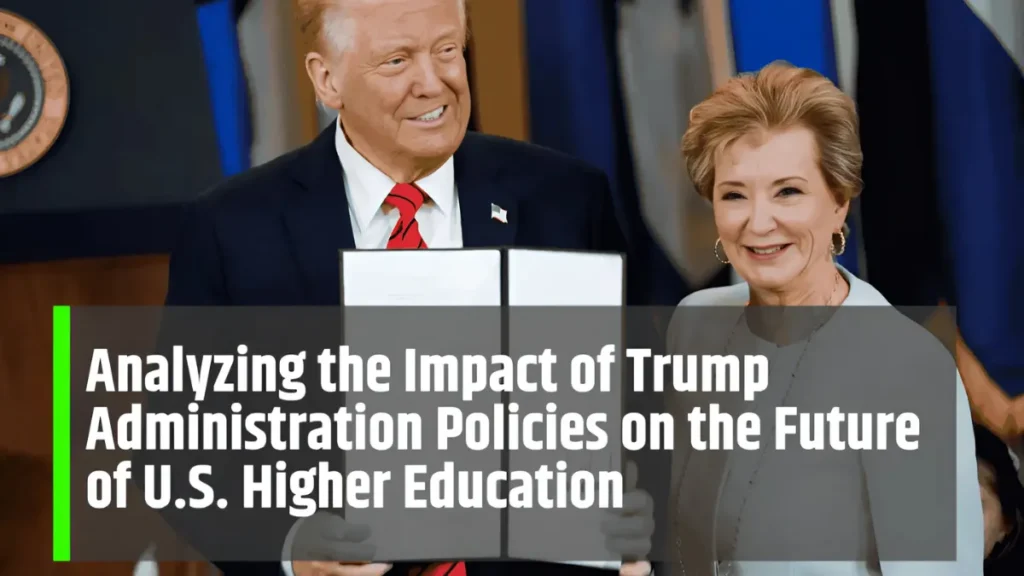The 2025 academic year has opened under sweeping changes from the Trump Administration Policies. From diversity programs and student visas to Title IX, student loans, and accreditation rules, federal policies are reshaping what students and universities can expect in the near future. Here’s a closer look at the most important changes and their impact on the student experience.
DEI Programs Under Fire but Still Standing
In August 2025, a federal judge blocked the Education Department’s attempt to ban Diversity, Equity, and Inclusion (DEI) programs in schools and colleges. The ruling means that DEI offices, scholarships, and mentorship initiatives can continue for now. However, the administration may appeal, keeping the future of DEI uncertain.
Impact for students: Campus diversity programs remain available, but many universities are narrowing activities to prepare for possible legal challenges.
Student Visa Rules Getting Stricter
The Department of Homeland Security has proposed capping F-1 and J-1 visas at a fixed four-year limit, ending the long-standing “duration of status” system. International students in longer programs, like PhDs, would need to apply for extensions through USCIS.
Impact for students: More paperwork, higher costs, and tighter timelines for visa renewals and Optional Practical Training (OPT).
Title IX Narrowed Again
Title IX protections have been scaled back toward the stricter 2020 framework, limiting which incidents fall under federal oversight. Off-campus or online harassment may not be covered under the new rules.
Impact for students: Fewer Title IX investigations, leaving many cases to be handled by campus codes of conduct or state laws.
Accreditation Shake-Up
New policies make it easier for colleges to switch accreditors or seek new oversight bodies. While this flexibility could benefit some institutions, it also adds instability. Federal recognition of accreditors now plays a bigger role in shaping academic standards.
Impact for students: Potential changes in transfer credit acceptance, licensure pathways, and financial aid eligibility if colleges shift accreditors.
Student Loans: Repayments Resume
The Trump administration has restarted student loan collections and is pressing to scale back or eliminate forgiveness programs. Many borrowers are facing higher repayment costs, and the SAVE income-driven plan is under legal and political pressure.
Impact for students: Rising repayment burdens could lead to more dropouts, financial stress, and appeals for additional aid.
Campus Speech and Research Under Pressure
Campuses have also faced scrutiny over protests and free speech. Federal investigations have linked funding and research grants to how universities handle demonstrations and political expression. Institutions are tightening protest policies to avoid penalties.
Impact for students: Stricter rules on demonstrations, heightened security on campuses, and growing caution among administrators.
Quick Take: How Students Will Feel the Changes
| Policy Area | Impact on Students |
|---|---|
| DEI Programs | Still active, but scaled back under legal uncertainty |
| Student Visas | More paperwork, fees, and deadlines for extensions |
| Title IX | Narrower protections; off-campus issues less covered |
| Accreditation | Possible transfer and licensure challenges |
| Student Loans | Higher repayment pressure, limited forgiveness |
| Campus Speech | Stricter protest rules and funding tied to compliance |
Conclusion: Trump administration policies are reshaping every corner of U.S. higher education—from how international students study to how campuses handle diversity, speech, and financial aid. While some rulings have temporarily blocked changes, the broader trend points to tighter rules, more oversight, and fewer protections for students.
Disclaimer: This article is for informational purposes only. For the latest updates, students should consult their university’s policy office, the U.S. Department of Education, and USCIS.
Read More:
- US Student Visa Rules Get Stricter in 2025: What International Students Must Know
- US Campuses Fall 2025: How Politics and Federal Policies Are Changing Student Life
- Federal Court Blocks DEI Ban: What It Means for Schools and Colleges in 2025
- Social Security September 10, 2025 Payment: Exact Amount Beneficiaries Will Receive
- $1,400 IRS Payment 2025: Who Really Qualifies and How to Track Your Status





